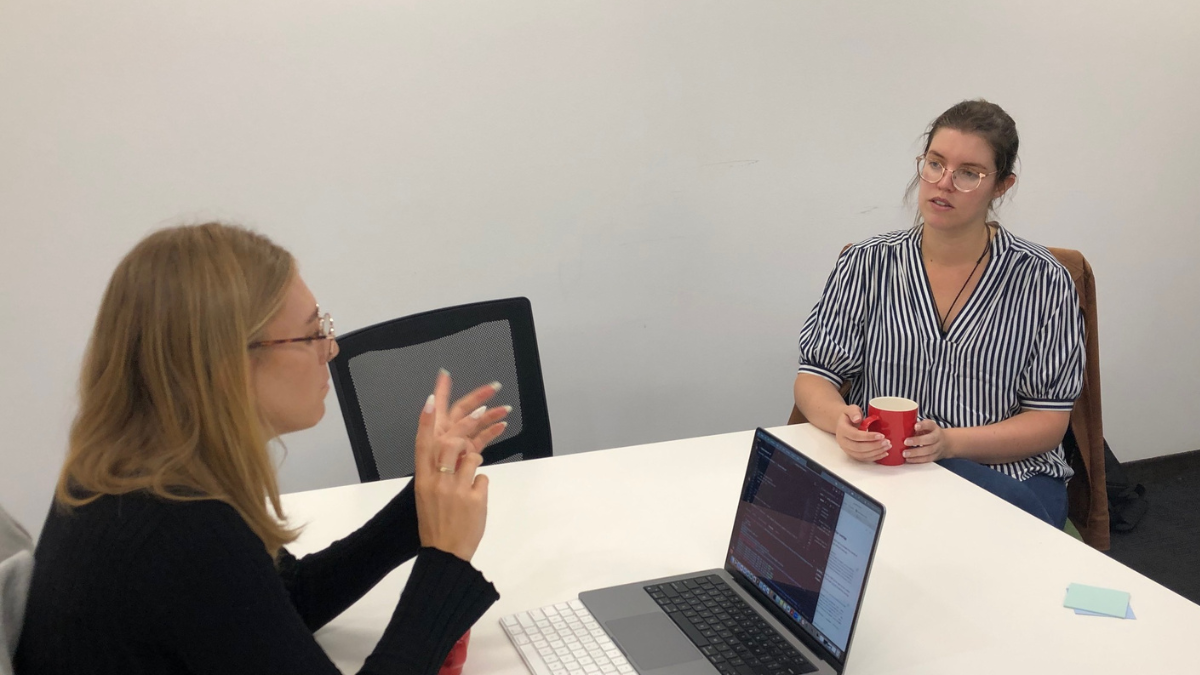Training with real-world genetic data to advance Australia’s urgent conservation goals
Katarina (right) working closely with Mikaeylah (left).
A diverse group of researchers converged at The University of Melbourne this month to work through their unique bioinformatics challenges under the guidance of The University of Auckland’s Dr Katarina Stuart. The genetic outlier analysis workshop invited participants to bring along their own datasets to analyse over two days. Working with real-world data offered attendees the opportunity to apply new techniques in their field, learn how methods may need to be tweaked, and importantly progress their research.
Mikaeylah Davidson, a PhD Candidate in the Faculty of Science’s One Health Research Group at The University of Melbourne, relished the opportunity to bring her own data:
Being able to engage with the data I'm actively working on was incredibly beneficial, as it provided me with the chance to seek assistance in troubleshooting issues I am currently encountering, as well as gaining insight into recurring challenges and how to address them effectively. This hands-on approach was incredibly helpful.
Mikaeylah’s research explores the potential of selective breeding as a tool to combat wildlife disease. While selective breeding has been used extensively for genetic improvement in domesticated animals, its application in conservation remains largely unexplored. Mikaeylah’s PhD is focused on the Southern Corroboree frog, which is critically endangered due to the introduction and spread of the deadly amphibian chytrid fungus.
Aiming to leverage the existing conservation breeding program based within the zoos, she hopes to identify phenotypic and genetic traits associated with resistance to the chytrid fungus. If successful, this could pave the way for the implementation of a selective breeding program aimed at reducing detrimental alleles and amplifying beneficial ones within the population. Ultimately, the goal is to breed Southern Corroboree frogs that have a heightened tolerance to the fungus, enabling their survival in the wild despite the presence of chytrid.
The highly practical workshop stepped through the use of command line programs, while providing the opportunity to ask questions of their use, functions and applicability. Multiple genetic outlier analysis methods were explored while learning how and when different methods should be used. The pros and cons of different methods helped explain which are best suited to different data types. This type of information can be very difficult to find without experience, or many hours of working though various software and protocols, according to Elliott Schmidt, a PhD Candidate from James Cook University:
I believe that this workshop has saved me many hours of troubleshooting my genetic outlier analysis. Coming away from the workshop with example scripts composed using my own data has given me confidence that my approach to analysing my data is appropriate and efficient, and can now be completed independently.
Elliott flew down from Townsville to progress his research into how evolutionary perspectives can be incorporated in conservation of a coral reef fish. His PhD project explores how different populations of a coral reef damselfish, Acanthochromis polyacanthus, distributed across the Great Barrier Reef may respond differently to warming ocean temperatures. He’s tackling this question by investigating local adaptation, differences in developmental plasticity, and population genetics. By incorporating physiological experiments with population genetics Elliott hopes to identify potential differences in vulnerability to warming temperatures between different populations as well as provide explanations for these differences via genetic analysis.
Hearing about the challenges faced by researchers working with different datasets was a highlight, and many of the 11 participants reported valuing the opportunity to engage in discussions with peers. Working intensively with their expert trainer and each other’s data, their ability to query and interpret varied datasets was honed. Mikaeylah particularly enjoyed the highly interactive elements:
Working through our real data enabled me to further my understanding of my own, while also offering insights into the challenges others face with their datasets. I found the exchanges on results interpretation very helpful, and also interesting, as they allowed me to learn how to interpret diverse datasets and troubleshoot different issues which may arise.
This workshop was part of a series of events made available through a collaboration between the Genetics Society of AustralAsia (GSA) and Australian BioCommons. There was also an online genetic outlier analysis workshop held in February, and another in person workshop will be held this July in conjunction with the GSA2024 Conference in Sydney. The workshops were supported by GSA’s Workshop Support Program that aims to help share knowledge and/or exchange ideas across genetics.
More information on the next hands-on workshop: Genetic outlier analysis (Sydney).


